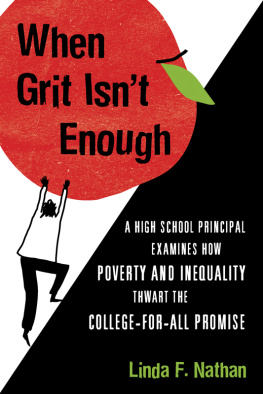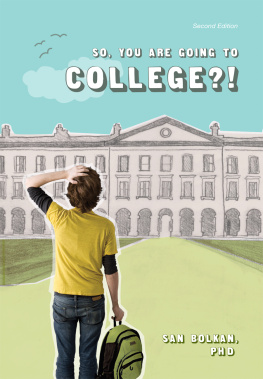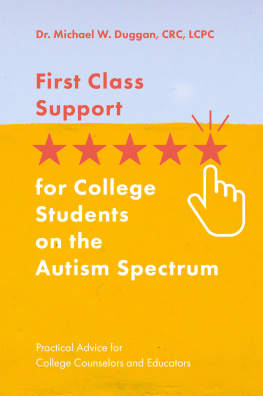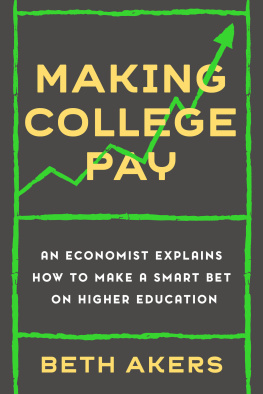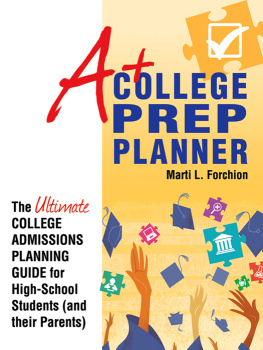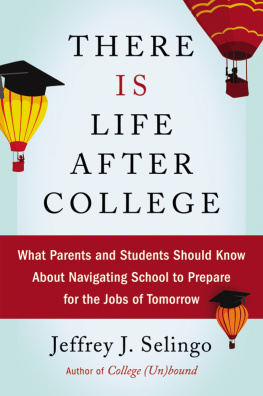PRAISE FOR WHEN GRIT ISNT ENOUGH
For those who are serious about using education to serve as a vehicle for lifting people out of poverty, this book provides a sobering explanation of why it is so hard to do. Linda Nathan uses her many years of experience leading a successful urban high school to draw attention to the myriad of obstacles that so often thwart even the best-prepared and most ambitious students from achieving their goals. In doing so, she reminds us that it takes more than upbeat slogans and cheerleading to use education as a means to climb out of poverty. Insightful, revealing, and at times heart-wrenching, this book is an invaluable resource for those who hope to use education to transform the lives of our most vulnerable youth.
PEDRO A. NOGUERA , PhD, author of Excellence Through Equity and Distinguished Professor of Education, UCLA Graduate School of Education and Information Studies
When Grit Isnt Enough does a brilliant job of dismembering the prevailing fallacies about what makes for student success in higher education. Seamlessly weaving together stories and analysis, veteran educator Linda Nathan shows how, for poor, minority, and first-gen students, money (more precisely, the lack of money) and race do matter, and how its fatuous to tell students on the cusp that, to make it, all they have to do is buckle down. When Grit Isnt Enough is both a powerful indictment of higher education and a blueprint for reform. If you read one book on education this season, make it this one.
DAVID L. KIRP , Professor of the Graduate School, University of California at Berkeley, and contributing writer, New York Times
Its a marvelous book, and badly needed at this time. Drawing on the powerful stories of children at the Boston Arts Academy, Linda Nathan bravely confronts the widely circulated myth that children who grow up in poverty can overcome inequity and every other daunting obstacle they face if they just believe, persevere, work like hell, and show sufficient grit. Many of these students do prevail, but Nathan makes it clear that grit is not enough and that our adherence to this appeasing myth is letting a divided and bitterly unequal social order off the hook.
JONATHAN KOZOL , author of Savage Inequalities: Children in Americas Schools
In When Grit Isnt Enough, veteran educator Linda Nathan gives the lie to five popular but unproven beliefs about education that do little to improve schooling but instead blame the victims of poor and unequal schooling. This is a courageous book, one that challenges all of us, educators and non-educators alike, to do better for our most vulnerable students.
SONIA NIETO , author of Why We Teach Now and professor emerita, Language, Literacy, and Culture, College of Education, University of Massachusetts, Amherst
In When Grit Isnt Enough, Linda Nathan challenges deeply held beliefs like race and money dont matter and if you just believe in yourself, then your college dreams will come true. Through personal stories of alums of Nathans school, along with extensive research, she argues that these assumptions can do harm. In this very readable book, she asks educators to confront the ethics of promoting these assumptions when other options, like high-quality career and technical education, can launch a low-income young person into a productive and enriched adulthood. A brave, honest, and optimistic book.
NANCY HOFFMAN , cofounder, Pathways to Prosperity Network, and senior advisor, Jobs for the Future
Storytelling can serve as a powerful tool for truth telling. Linda Nathans When Grit Isnt Enough is truth telling at its best! Drawn on more than thirty years of teaching and leading in public education settings, Lindas stories show us, in no uncertain terms, how five long-held assumptions about American education are hurting thousands of talented urban students. Linda exposes us to painful truths and provides us with practical, implementable, and replicable solutions that can reverse these long-standing false assumptions. Most of all, she leaves us with hope, inspiration, and direction.
JACKIE JENKINS-SCOTT , president emerita, Wheelock College, Boston
In an age where we need courage far more than courtesy, Linda Nathan uses this book to do some much needed truth telling about schooling today. The American Dream that hard work will pay off is now a fallacy, and she shows us how and why.
SARA GOLDRICK-RAB , professor of higher education policy and sociology at Temple University and author of Paying the Price: College Costs, Financial Aid, and the Betrayal of the American Dream

INTRODUCTION
The Promise
Its lunchtime at the Boston Arts Academy and the cafeteria is bustling. In one corner, students show off their dance moves. At the opposite corneras far away from the music as they can getsit a group of about eight students hunched intently over sketchbooks as their conversations veer from the latest anime characters to the upcoming intersession course on fan fiction. Students at other tables engage in the more mundane tasks of eating, flirting, and checking homework. Lunch is the only time of day when the entire student body of about 440 is together, when students get some downtime to zone out for a few minutes away from the stresses of the school dayor their post-graduation plans. A number of seniors who can no longer put off those concerns make a beeline for the cramped office of BAAs college and career counselor, Ms. Hairston. They are determined to get a head start on college applications by taking advantage of Ms. Hairstons limited time and seemingly unlimited knowledge.
Students at BAA reflect the demographics of public high schools across the city of Boston. This figure is somewhat lower than the entire Boston Public Schools system, in which 78 percent of all students qualify. At BAA, 33 percent speak a language other than English at home, compared with 46 percent for the entire school system. Nearly 30 percent of Boston Public Schools students require specialized English-language learner (ELL) services, whereas only 6 percent of BAA students are registered for these services. Approximately 16 percent are students with identified special needs requiring instructional accommodations. This figure is somewhat higher for the school system at large.
In 1998, I became the founding headmaster of this specialized arts high school, where students audition in one of four majors (music, dance, theater, visual arts) for a coveted spot in the freshmen class. Each and every year that I was headmaster (until 2013), the students heard me say: All of you will graduate from high school. And all of you will continue on to either college or a career. Perhaps I was trying to hypnotize them into self-actualizing this: after all, dropping out of high school is almost a one-way ticket to poverty, and I did not want any of my students to be part of that national statistic. Across the United States, only 59 percent of young black men and 65 percent of young Latino men graduate from high school in four years, compared with 80 percent of young white males.
There was a reason those seniors were hustling to Ms. Hairstons office that day: the Boston branch of the Posse Foundation was scheduled to announce its winners. In the Boston area, there are sixty Posse scholarships awarded annually. Over the years, on average, BAA seniors have received anywhere from one to four of the slots. Receiving a Posse means a four-year scholarship to a prestigious liberal arts college, as well as specialized and intensive advising, and a real posse, or support group, to meet with throughout all four years. Even students who may not at first be interested in attending the selected Posse schools still hope to compete for the coveted scholarships. Seniors know that if they are recommended and succeed in the first round of competitive group interviews, becoming a finalist, they have a chance of graduating from a good college without having to worry too much about money. They may have to worry about being far from home and one of the few poor or minority kids on campus, or about feeling completely out of place socially or culturally, but they will be on their way to a degreeand they will have their posse.

